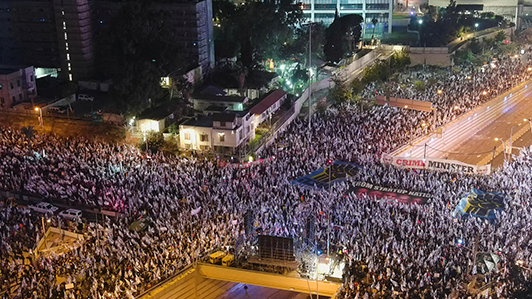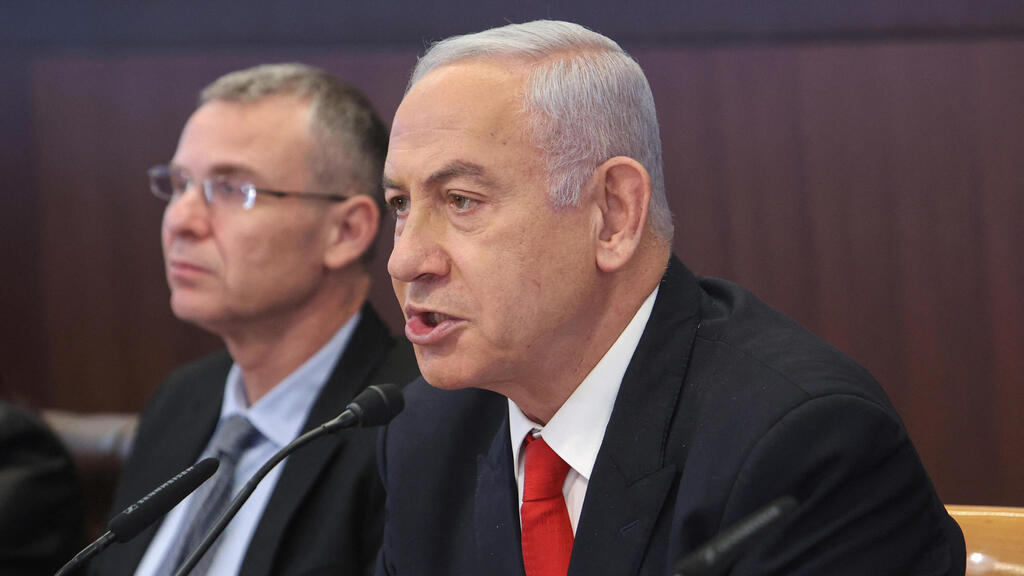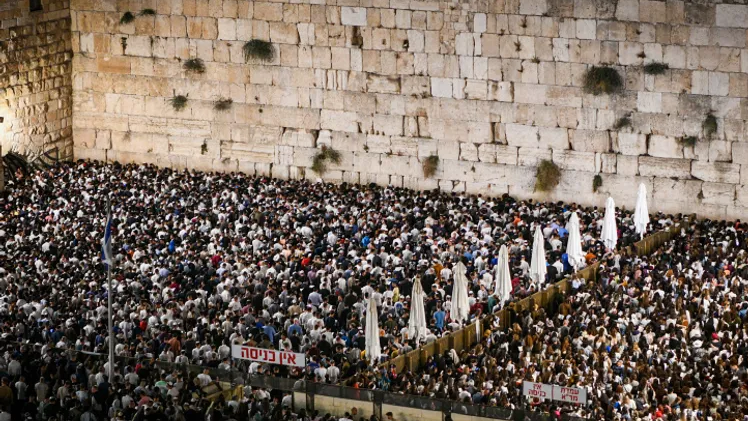Getting your Trinity Audio player ready...
Hundreds of thousands of Israelis took to the streets on Saturday night, protesting the sweeping judicial reforms that the government recently began to legislate. These demonstrations were held for the ninth consecutive weekend and followed a “day of disruption” earlier in the week that saw the first use of stun grenades and water cannons by police against protestors.
All the while, the government carries on legislating the reforms, seemingly unrattled by the protests.
Israeli Prime Minister Binyamin Netanyahu and his coalition say the changes are necessary for a country where the judicial system has accumulated too much power in recent decades. In their opinion, the Supreme Court too often intervenes in political issues that should be determined by the Knesset, Israel’s parliament.
The judicial overhaul would give the Knesset the ability to override Supreme Court rulings with a simple majority. Politicians would have greater influence in the appointment of judges, and legal advisers to ministers would be political appointees rather than civil servants.
In recent years, a heated debate over Netanyahu has divided the country into two opposing camps, which are being further polarized by the current discourse on judicial reforms. Israel’s longest-serving premier, Netanyahu is on trial on several counts of corruption. His supporters say that he is the target of a vindictive opposition that cannot topple him through elections and is looking to do so through the courts. His opponents say his legal status should bar him from running the state, although there is no law denying him that right.
“After the reforms pass, things will cool down,” attorney Ze’ev Lev, legal counsel for the Movement for Governability and Democracy, said in an interview.
Lev said that throughout the many election campaigns that Israel has held in the last fifteen years, discourse has always revolved around issues being debated in the courts, leading to intense polarization. He cited the Netanyahu trial, the ruling on mandatory military service, and trials of other leading politicians as Supreme Court cases that have been at the center of Israeli political debate.
“The citizens will not feel anything immediately, but we will see calmer election campaigns,” Lev said.
One of the main criticisms that proponents of the reforms direct toward the court is the lack of diversity among judges.
“Gradually, we will see better representation in the courts and the decisions on such matters will be in the parliament, and not in the courts,” Lev said. “People will debate legislation and the discourse will be mostly in the center. Parties will have a greater interest to be in coalitions because they will want to control judge selection, and this will lead to the centralization of politics, and we will see less of the binary split that has characterized the recent years.”
Detractors see things differently.
“The new judges will be politically aligned, and sitting judges will be incentivized to rule according to the coalition in order to guarantee their promotion,” said Dr. Guy Lurie, a research fellow at the Israel Democracy Institute. “When political consideration and loyalty become most important, it means the professional considerations become less prominent, and there is concern that the professionalism of new judges will be harmed. This will not happen overnight, but gradually.”
Proponents of the reform argue that the political appointment of judges is in fact an expression of democracy.
“There is nothing wrong with the public’s representatives choosing the public’s judges,” said Professor Oded Mudrik, a former Tel Aviv District Court judge. “The legislators set the norms and make the laws. That carries more weight than the judicial process. In their entirety, the principles of the reform do not harm democratic rule in Israel.”
Opponents such as Lurie say that the government is conducting a judicial coup, not a reform. They say that the plans will significantly undermine Israeli democracy by weakening the courts and giving the ruling coalition absolute authority.
“The public will see the courts with limited ability to defend its rights,” Lurie said. “The constitutional protection of freedom of expression, freedom of demonstration, equality and the right to privacy will be weak because there will be no judicial review on legislation.”
“If the reform passes, the courts will not be able to defend the citizens,” he added.
According to Mudrik, such fears are unfounded.
“Those who are scared do not understand the meaning of the reforms,” Mudrik said. “However, these anxieties have great meaning and therefore these feelings must not be underestimated. Some of those people who are concerned might pull out their money, emigrate from the country or not show up for military reserve duty.”
“Netanyahu and [Justice Minister and Deputy Prime Minister Yariv] Levin may be correct in their desire to reform, but they cannot deal with the snowball effect that these reforms can create and may end up harming the country,” he added, calling for them to moderate their proposals.
It is this snowball effect that could leave Israel’s citizenry reeling after the passage of the reforms, deeply divided, and struggling to find common ground.
Those who recognize this threat have called for dialogue between the sides, but those calls have not been heeded. It seems that the coalition is determined to finish legislating the reforms in the coming weeks.
As part of the overhaul, Simcha Rothman, who chairs the Knesset’s Constitution, Law and Justice Committee, said that he will promote a law limiting the right to strike. The current Israeli law allows all workers other than security forces to strike. There has been a significant public outcry against the law, which would limit what is seen in the country as a fundamental worker’s right.
“If the right to strike will be disproportionately harmed, the court will not be able to annul such legislation because it will not have the ability to effectively give constitutional protection to such rights,” Lurie explained.
As head of the committee in which all legal reforms will be discussed, Rothman is seen as the main agent carrying out the government plans. Together with the justice minister, he has become the poster child of the reforms.
Those promoting the reforms say that rights will be protected regardless of the judicial overhaul.
“To fear in advance is unjustified,” Lev said. “The thought that it is the courts that protect minorities, and the parliament harms them is baseless. The majority of the Israeli public, represented in the parliament, is positioned in the center.”
“The majority of voters and parties will not stand for the infringement of minority rights,” he added, saying that Israeli society has become so polarized in recent years regarding Netanyahu and now the judicial reforms that it has lost sight of common ground.
Critics of the reform point to numerous minority rights on the line that could be damaged by the passage of the reforms.
“We will see a consistent infringement on women’s rights should the reforms pass,” said Moran Zer Katzenstein, founder of Bonot Alternativa, a feminist group that works to counter discrimination and violence against women. “There will be things we will feel immediately.”
Zer Katzenstein is particularly concerned with amendments to the judge selection committee, which, under the current government, will likely lead to the appointment of more conservative judges.
“The current government, which has fewer women in it, will also likely appoint fewer women as judges,” she added.
An attempt by the ultra-Orthodox Shas party to introduce a law that would mandate a strict dress code at the Western Wall, the holiest Jewish prayer site in Jerusalem, was quickly shot down with widespread criticism, not only from the opposition but also by Netanyahu himself. But critics of the judicial reforms say that it is only the courts that can guarantee that discriminatory laws of that sort are prevented from passing.
“Such laws could be passed in a much wider version,” said Zer Katzenstein. “Once the override clause passes, we will have no judicial remedy for this. Any legislation against women could pass without hindrance.”
In the coalition agreements, the parties agreed to promote legislation that legalizes gender separation in cultural affairs, education institutions, and public services.
The proposed reforms will also give more authority to rabbinical courts. Secular Israelis and Jewish organizations which promote a more pluralistic view of the religion are concerned that a limitation on judicial review will allow ultra-Orthodox parties to impose a narrower religious agenda on the nation.
With elections a frequent occurrence in Israel, the judicial makeup will also change accordingly, albeit gradually. Laws passed under one government could be easily changed by another.
“The reform will most certainly affect contradicting individual rights and the consideration of national interests vis-à-vis individual rights,” said Mudrik. “The balance between rights, values, and interests will be dictated according to the chosen government, and not according to a handful of appointed judges.
Despite calls for dialogue from President Isaac Herzog and others, the reforms are being advanced without any pause for genuine discussion with the other side. The coalition may unilaterally decide to make modifications to pacify the opposition, or it may decide to push forward with its original plan.
Lack of communication and increasingly inflammatory rhetoric does not bode well for the future of Israel’s already polarized society. Just as the reforms themselves will shape the country, the atmosphere around their passage will also likely bear its mark.
The story was reprinted with permission from The Media Line






